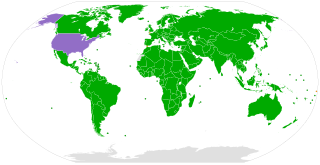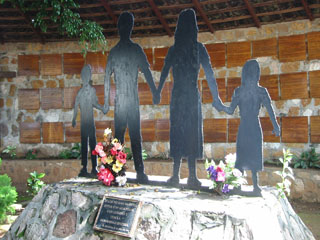
The European Convention on Human Rights is an international convention to protect human rights and political freedoms in Europe. Drafted in 1950 by the then newly formed Council of Europe, the convention entered into force on 3 September 1953. All Council of Europe member states are party to the convention and new members are expected to ratify the convention at the earliest opportunity.
International human rights instruments are the treaties and other international texts that serve as legal sources for international human rights law and the protection of human rights in general. There are many varying types, but most can be classified into two broad categories: declarations, adopted by bodies such as the United Nations General Assembly, which are by nature declaratory, so not legally-binding although they may be politically authoritative and very well-respected soft law;, and often express guiding principles; and conventions that are multi-party treaties that are designed to become legally binding, usually include prescriptive and very specific language, and usually are concluded by a long procedure that frequently requires ratification by each states' legislature. Lesser known are some "recommendations" which are similar to conventions in being multilaterally agreed, yet cannot be ratified, and serve to set common standards. There may also be administrative guidelines that are agreed multilaterally by states, as well as the statutes of tribunals or other institutions. A specific prescription or principle from any of these various international instruments can, over time, attain the status of customary international law whether it is specifically accepted by a state or not, just because it is well-recognized and followed over a sufficiently long time.

The European Court of Human Rights (ECtHR), also known as the Strasbourg Court, is an international court of the Council of Europe which interprets the European Convention on Human Rights (ECHR). The court hears applications alleging that a contracting state has breached one or more of the human rights enumerated in the convention or its optional protocols to which a member state is a party. The court is based in Strasbourg, France.

The United Nations Convention on the Rights of the Child is an international human rights treaty which sets out the civil, political, economic, social, health and cultural rights of children. The convention defines a child as any human being under the age of eighteen, unless the age of majority is attained earlier under national legislation.

The law of war is the component of international law that regulates the conditions for initiating war and the conduct of hostilities. Laws of war define sovereignty and nationhood, states and territories, occupation, and other critical terms of law.
International human rights law (IHRL) is the body of international law designed to promote human rights on social, regional, and domestic levels. As a form of international law, international human rights law is primarily made up of treaties, agreements between sovereign states intended to have binding legal effect between the parties that have agreed to them; and customary international law. Other international human rights instruments, while not legally binding, contribute to the implementation, understanding and development of international human rights law and have been recognized as a source of political obligation.

The American Convention on Human Rights, also known as the Pact of San José, is an international human rights instrument. It was adopted by many countries in the Western Hemisphere in San José, Costa Rica, on 22 November 1969. It came into force after the eleventh instrument of ratification was deposited on 18 July 1978.

The European Social Charter is a Council of Europe treaty which was opened for signature on 18 October 1961 and initially became effective on 26 February 1965, after West Germany had become the fifth of the 13 signing nations to ratify it. By 1991, 20 nations had ratified it.
International humanitarian law (IHL), also referred to as the laws of armed conflict, is the law that regulates the conduct of war. It is a branch of international law that seeks to limit the effects of armed conflict by protecting persons who are not participating in hostilities and by restricting and regulating the means and methods of warfare available to combatants.

The Optional Protocol to the Convention on the Rights of the Child on the Involvement of Children in Armed Conflict (OPAC), also known as the child soldier treaty, is a multilateral treaty whereby states agree to: 1) prohibit the conscription into the military of children under the age of 18; 2) ensure that military recruits are no younger than 16; and 3) prevent recruits aged 16 or 17 from taking a direct part in hostilities. The treaty also forbids non-state armed groups from recruiting anyone under the age of 18 for any purpose.

The Committee on the Rights of the Child (CRC) is a body of experts that monitor and report on the implementation of the United Nations Convention on the Rights of the Child.

Human rights in Kenya internationally maintain a variety of mixed opinions; specifically, political freedoms are highlighted as being poor and homosexuality remains a crime. In the Freedom in the World index for 2017, Kenya held a rating of '4' for civil liberties and political freedoms, in which a scale of "1" to "7" is practised.
Lehideux and Isorni v. France, was a case heard by the European Court of Human Rights on punishing statements praising collaborators. In a judgement handed down 23 September 1998, the court has held by fifteen votes against six that the conviction of applicants for their article in favour of Philippe Pétain was prescribed by law and pursued a legitimate aim, but wasn't necessary in a democratic society and therefore violated Article 10.

Human rights in Somalia throughout the late 20th-century and early 21st-century were considered dire, but have gradually improved over the following years. Human rights are guaranteed in the Federal Constitution, which was adopted in August 2012. They fall under the Ministry of Human Rights established in August 2013. The central authorities concurrently inaugurated a National Human Rights Day, endorsed an official Human Rights Roadmap, and completed Somalia's first National Gender Policy.

Human rights in Chad have been described as "poor"; for example, Freedom House has designated the country as "Not Free." Chad received a score of 7 for political rights and 6 for civil liberties.
Additional Protocol to the Convention on Cybercrime, concerning the criminalisation of acts of a racist and xenophobic nature committed through computer systems is an additional protocol to the Council of Europe Convention on Cybercrime. This additional protocol was the subject of negotiations in late 2001 and early 2002. Final text of this protocol was adopted by the Council of Europe Committee of Ministers on 7 November 2002 under the title "Additional Protocol to the Convention on cybercrime, concerning the criminalisation of acts of a racist and xenophobic nature committed through computer systems, ("Protocol"). The Protocol opened on 28 January 2003 and entry into force is 1 March 2006. As of July 2017, 29 States have ratified the Protocol and a further 13 have signed the Protocol but have not yet followed with ratification.
The Rule of Law in Armed Conflicts Project is an initiative of the Geneva Academy of International Humanitarian Law and Human Rights to support the application and implementation of the international law of armed conflict.

The Geneva Conventions are international humanitarian laws consisting of four treaties and three additional protocols that establish international legal standards for humanitarian treatment in war. The singular term Geneva Convention colloquially denotes the agreements of 1949, negotiated in the aftermath of the Second World War (1939–1945), which updated the terms of the two 1929 treaties and added two new conventions. The Geneva Conventions extensively define the basic rights of wartime prisoners, civilians and military personnel; establish protections for the wounded and sick; and provide protections for the civilians in and around a war-zone.

Human rights in Cape Verde are addressed under the national constitution.

Basic human rights in Italy includes freedom of belief and faith, the right of asylum from undemocratic countries, the right to work, and the right of dignity and equality before the law. Human rights are the basic rights of every citizen in every country. In Italy, human rights have developed over many years and Italy has education on human rights. In addition, Italy has specific human rights for women, children and LGBT people.












